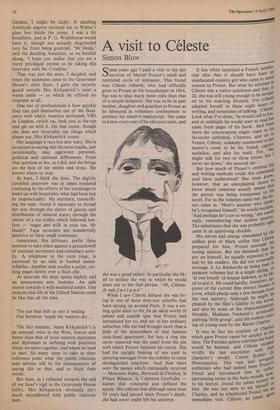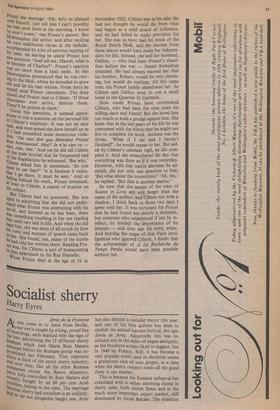A visit to Celeste
Simon Blow
Some years ago I paid a visit to the last Some
of Marcel Proust's small and restricted circle of intimates. This friend was Celeste Albaret, who had officially gone to Proust as his housekeeper in 1914, but was to play many more roles than that of a simple domestic. She was to be in part mother, daughter and guardian to Proust as he laboured in voluntary confinement to produce his massive manuscript. She came to know every one of his idiosyncrasies, and
she was a good mimic. In particular she lik- ed to imitate the way in which he would draw out to her that phrase, `Ah, Celeste. Je suis f-a-t-i-g-u-e.'
When I saw Celeste Albaret she was liv- ing in one of those post-war suburbs that have sprung up around Paris. It was a set- ting quite alien to the fin de siecle world of salons and seaside spas that Proust had introduced her to, and yet to her ordinary suburban villa she had brought more than a little of the atmosphere of that famous cork-lined apartment. Set into a ring she never removed was the pearl from the pin with which Proust fastened his cravat. She had the upright bearing of one used to carrying messages from the nobility to some distinguished employer. And then there were the names which continually recurred — Monsieur Hahn, Bertrand de Fenelon, le Prince Bibesco, la Comtesse Greffulhe names that reinstated and defined the epoch. She told me that although more than 50 years had passed since Proust's death, she had never really left his universe. It has often surprised a French intellec- tual elite that it should have been 8r1., uneducated country girl who came to static! nearest to Proust. But what he admired in Celeste was a native quickness and that, Aa., 22, she was still young enough to be inotih r ed to his exacting lifestyle. For Celeste adapted herself to those night hours of writing, and sometimes of talking. 'Celeste. Look what I've done,' he would call to her, and at midnight he would start to read her some fresh pages of his book. And from there the conversation might roam to his favourite cathedral, Chartres, and on to Venice. Celeste, suddenly summoned to her master's room to be his friend, captive audience, and also his maid. For, 'We might talk for two or three hours, but I never sat down,' she assured me. But how much of Proust's cerebral life and writing methods could this unlettered soul have understood? She soon knew' however, that an unexplained desire to know about someone usually meant that the person was being transposed to his novel. For as the volumes came out, the let- ters came in. 'Here's another who thinks he's recognised himself,' he would exelailli. A011 `And perhaps he's not so wrong,' she 7m reply, remembering that sudden intereti The admittance that she was probablY right came in an approving chuckle. His nerves and energy stimulated by the endless pots of black coffee that Celeste prepared for him, Proust pursued his testing mission. But the demands that he e put on himself, he equally expected
to b met by his readers. He did not even
tual!Y envisage A La Recherche as being read ,Ifir separate volumes but in a single sitting, 'at one breath' (a longue haleine), as he lik ed to put it. He could hardly, therefore, aici P rove of the current film extract Swann I_ tLhoev Love, w h itapestry.ch pl u ck s Althougho n l y afew he her eina might tiftro,a pleased by the film's fidelity to the and also by some of the characterisation_ • Notably, Madame Verdurin's artistical.lsY aspiring 'little group', and the restless cruis- ing of young men by the Baron Charles' It was in fact his creation of Charles which gave Proust cause for anxiety at the time. The Parisian salons told him the booA would be banned, and Celeste recallet vividly his last encounter with tli:e character's model, Comte Robert71t Montesquiou. This vain and arOgat,5 nobleman who had indeed been. Pr°usher friend and introduced him in rather friend terms to the beau monde, n° to his horror, found the tables turned as him. He was not slow to see hirnself a 5_ Charlus, and he telephoned Proust for voe immediate visit. Celeste, as usual, ga Proust the message. 'Oh, he's so pleased with himself, just tell him I can't possibly see him until three in the morning. I know he won't come,' was Proust's answer. But Nlontesquiou did arrive, and after reciting his own indifferent verses at the bedside, accompanied by a lot of nervous tapping of his cane, on leaving he asked Proust just One question: 'And tell me, Marcel, what is to become of Charlus?'. Proust's reaction was no more than a faint smile. At this Montesquiou announced that he was retir- ing to the Midi, where he intended to grow old and let his hair whiten. From there he would send Proust chocolates. The door Closed and Proust said to Celeste: 'If those chocolates ever arrive, destroy them. There'll be poison in them.' Given this anecdote, it seemed appro- priate to risk a question on the personal life Of Celeste's employer. It was not an easy !ask, and once posed she drew herself up as ,if. I had commited some monstrous viola- tion. 'On vent dire que Monsieur Proust etait homosexuel. Moi? Je n'ai rien vu rien, rien, rien.' And yet he did tell Celeste of the male brothel that he frequented and of, the flagellations he witnessed. 'But why, Celeste asked him in innocence, 'do you need to see that?' It is because it exists, thatI go there. It must be seen.' And so ng behind his work, Proust remained, at least to Celeste, a master of evasion on
the subject.
But Celeste had no pretences. She was °Pen in admitting that she did not under- stand what Proust was attempting with his novel, and lionised as he has been, there was something touching in her not reading mill until very late in life. And when she did read him, she was most of all struck by how his voice and manner of speech came back he her. She found, too, many of the stories ne had told her written there. Reading Pro- ust was, for Celeste, a sort of homecoming to that apartment in the Rue Hamelin. When Proust died at the age of 51 in November 1922, Celeste was at his side. He had not thought he would die from what had begun as a mild attack of influenza, and he had failed to make provision for her. She was to have had his stock of the Royal Dutch Shell, and the income from these shares would have made her indepen- dent for life. Instead, she and her husband, Odilon, — who had been Proust's chauf- feur before the war — found themselves stranded. He had always warned her that his brother, Robert, would be very charm- ing, but would do nothing. All this came true; the Proust family abandoned her. So Celeste and Odilon went to run a small hotel in the Quartier St Germain. How could Proust have overlooked Celeste, who had been for nine years his willing slave and friend? But she loved him too much to hold a grudge against him. She knew that in the last years of his life he was consumed with the worry that he might not live to complete his work. Asthma was the threat. 'What if 1 die and I haven't finished?', he would repeat to her. But aid- ed by Celeste's constant vigil, he did com- plete it. And she remembered the day that everything was done as if it was yesterday. However, with that native alertness he ad- mired, she put only one question to him: 'But what about the correctionsl"Ah, yes,' he replied. 'But that is another matter.' So now that the names of the stars of Swann in Love are writ larger than the name of the author, and Celeste not even a shadow, I think back to those two days I spent with her. It was fortunate for Proust that he had found not merely a domestic, but someone who understood if not by in- tellect, by instinct the importance of his labours — and thus met his every whim.
And braving the anger of that Paris intel- ligentsia who ignored Celeste, I doubt that the achievement of A La Recherche du Temps Perdu would have been possible without her.











































 Previous page
Previous page